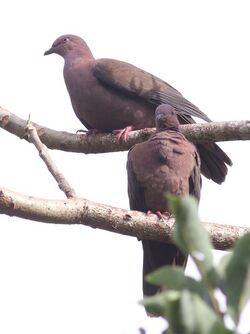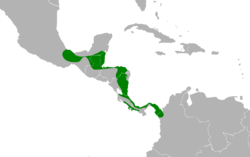Biology:Short-billed pigeon
| Short-billed pigeon | |
|---|---|

| |
| Scientific classification | |
| Domain: | Eukaryota |
| Kingdom: | Animalia |
| Phylum: | Chordata |
| Class: | Aves |
| Order: | Columbiformes |
| Family: | Columbidae |
| Genus: | Patagioenas |
| Species: | P. nigrirostris
|
| Binomial name | |
| Patagioenas nigrirostris (Sclater, PL, 1860)
| |

| |
| Synonyms | |
|
Columba nigrirostris (protonym) | |
The short-billed pigeon (Patagioenas nigrirostris)[2] is a largish pigeon which breeds from southern Mexico south to northwestern Colombia. It is a member of a clade of Patagioenas that contains the smaller and rather plain species with characteristic calls[2] that constitute the subgenus Oenoenas.[3]
It is found in lowland forest canopy and semi-open woodland, and builds a rudimentary platform nest out of twigs 5–30 m (16–98 ft) high in a tree or amongst vines. It lays one white egg.
The short-billed pigeon is 26.5 cm (10.4 in) long and weighs 150 g (5.3 oz). It is unpatterned and mainly wine-purple in colour, becoming browner on the belly and more olive-brown on the back. The tail and primary flight feathers are blackish, the bill is black, and the legs and eyes are purple-red. The female is slightly duller and browner than the male, and the juvenile bird has a greyish brown head, neck and breast, with cinnamon scaling on the head and upperparts.
The short-billed pigeon has a complex, loud and high-pitched call coo... cu-COO k’CO coohoo; this is usually uttered singly or at least with considerable pauses between calls.[3] It is normally sighted in pairs as it forages in the tree tops for mistletoe, fruits and berries, but may also be seen on tracks and roadsides seeking grit or small invertebrates.
In southern Central America, this species is replaced at higher altitudes by its close relative, the very similar ruddy pigeon, Patagioenas subvinacea. They can be distinguished by the slower, more complex "song" of the short-billed pigeon.[3]
References
- ↑ BirdLife International (2020). "Patagioenas nigrirostris". IUCN Red List of Threatened Species 2020: e.T22690334A139241150. doi:10.2305/IUCN.UK.2020-3.RLTS.T22690334A139241150.en. https://www.iucnredlist.org/species/22690334/139241150. Retrieved 11 November 2021.
- ↑ 2.0 2.1 Johnson, Kevin P.; de Kort, Selvino; Dinwoodey, Karen, Mateman, A. C.; ten Cate, Carel; Lessells, C. M. & Clayton, Dale H. (2001): A molecular phylogeny of the dove genera Streptopelia and Columba. Auk 118(4): 874-887. PDF fulltext
- ↑ 3.0 3.1 3.2 Mahler, Bettina & Tubaro, Pablo L. (2001): Relationship between song characters and morphology in New World pigeons. Biol. J. Linn. Soc. 74(4): 533–539. doi:10.1006/bijl.2001.0596 (HTML abstract)
- Stiles, F. Gary & Skutch, Alexander Frank (1989): A guide to the birds of Costa Rica. Comistock, Ithaca. ISBN:0-8014-9600-4
External links
- Short-billed pigeon photo; Article (AOCR)
- Short-billed pigeon photo gallery VIREO
- Short-billed pigeon videos on the Internet Bird Collection
Wikidata ☰ Q1266517 entry
 |


